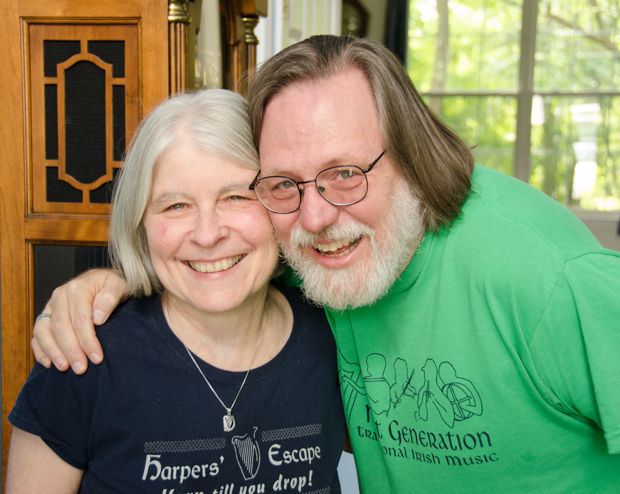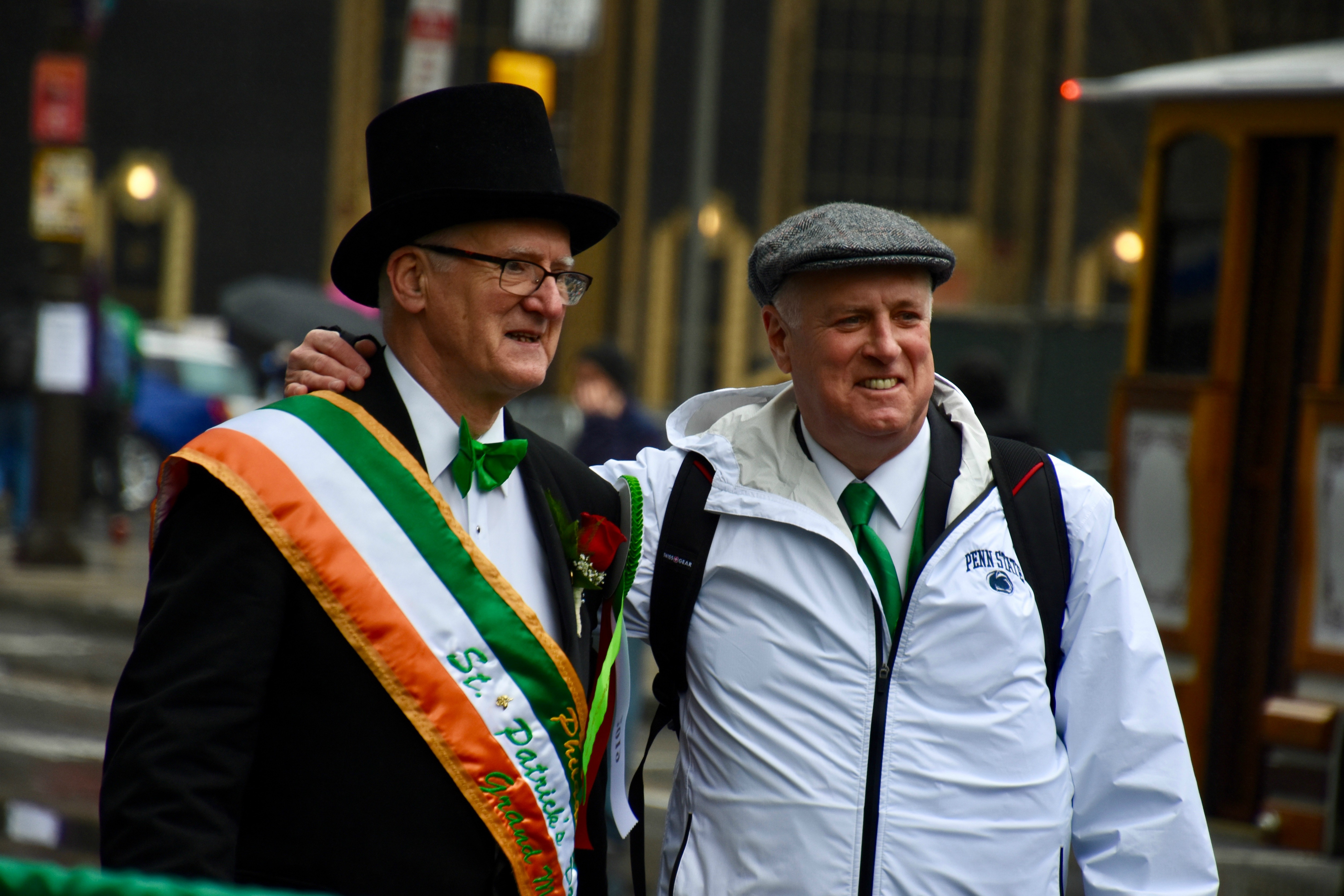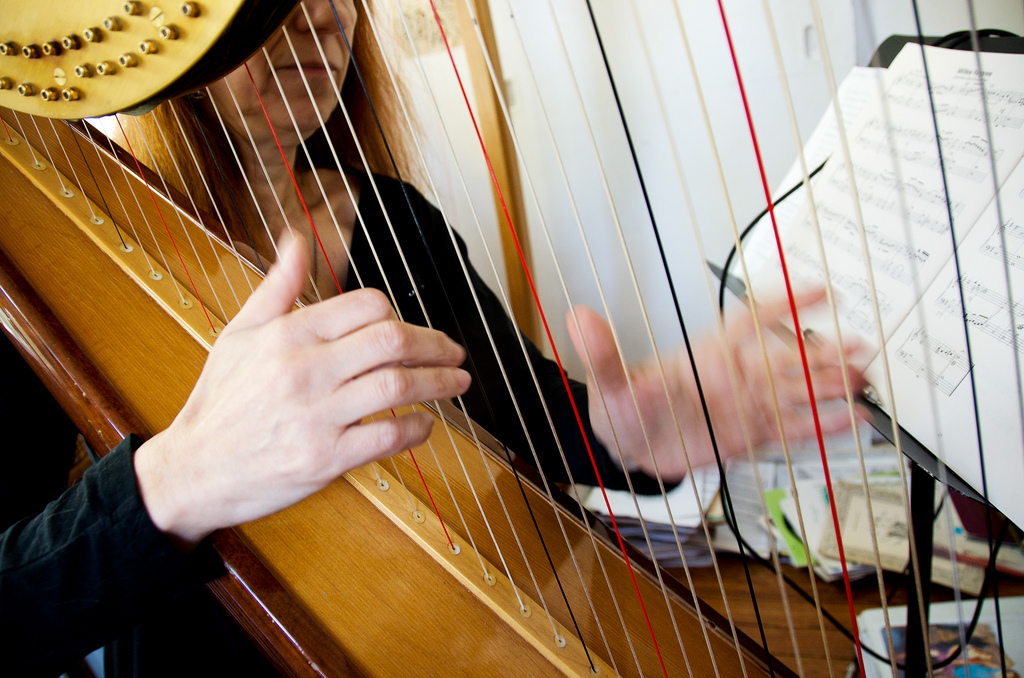Emma Gormley was kicking to the beat of the bodhran in utero, laying as an infant at the foot of her mother’s harp, and up on stage at the age of three singing the Irish folk song, “Johnny Todd,” to a huge audience for which her musician parents, Dennis Gormley and Kathy DeAngelo, were providing “the background music.”
DeAngelo laughs as she recalls the moment. “They weren’t paying any attention to us as they drank their glasses of wine, then suddenly, when they heard this big voice coming out of this little girl, they started listening. Dennis said to me, ‘She’s going to be just like you!”
When Emma took up the violin at school, her parents weren’t surprised. Between them, they play a full orchestra’s worth of instruments. Kathy is a self-taught guitarist, fiddler, and harper who also plays mandolin and banjo; Dennis plays anything with strings, flute and whistle. The entire family sings. They occasionally perform together. (See a photo of the whole family below.)
Kathy and Dennis, who met when they were college students in New Jersey in 1973, have been the Irish trad duo (and sometimes trio, with other performers), McDermott’s Handy since 1978. They have two CDs, the latest of which is “Bound for Amerikay: The Irish Emigrant Experience: Coming to America as Told Through Music, Song & Story.” They recorded and mixed it in their own basement studio.
Their lives have been steeped in music. But in 1997, when Emma was 10, her parents thought she needed a group of kids her own age to play with. Then that year, a friend who was director of the Garden State Discovery Museum in Cherry Hill asked DeAngelo if some of her and Dennis’s students could play Irish music during multicultural month celebrations. They rounded up a few kids, asked friend and fellow music teacher Chris Brennan-Hagy of Philadelphia to bring some of hers, and booked Tom Slattery, an Irish storyteller, for the event. “This is how things always happen,” says DeAngelo. “You think, okay, this will be easy!”
But none of the kids had ever played together. She wasn’t even sure they all knew the same tunes. “Then an hour before the show, the kids were in the back room waiting to go on, and suddenly there are three kids over here playing one tune together. Okay, you three are a trio. And another group of kids are playing something else together. And really, it all turned out pretty good for doing it by the seat of our pants. I thought to myself, imagine how it would help if they were learning a common repertoire. They’d be unstoppable.”
That’s how Next Generation was born. Along with Brennan-Hagy, DeAngelo and Gormley bought students together every second Sunday at the Philadelphia Irish Center where they could learn tunes and perform them together, like a children’s version of a pub session. Since 1997, on a volunteer basis, they’ve been nurturing the next generation—hence the name—of Irish traditional musicians, some when they were barely more than toddlers.
We are sitting in the comfortable kitchen of DeAngelo’s and Gormley’s Vorhees, NJ, home. Their parakeet Daisy flies freely from one end to the other before settling in her cage to nibble her cuttlebone. Outside, three wild turkeys are roaming the yard. “Come back for Thanksgiving,” jokes Gormley, who, along with teaching private students, works for a company that provides technology services for librarians.
Their carefree banter doesn’t betray the undercurrent of concern they share. In a few weeks after we met, DeAngelo, one of seven children, donated a kidney to her younger sister Ginny. After months of repeated testing, she turned out to be the only healthy match. “We have a lot to be thankful for,” is all she’ll say. (The operation was a success—for both women. )
The two would rather talk about the music. As it turned out, teaching the kids a common repertoire has made them unstoppable. For the last 18 years, Next Generation students have been going yearly to Ireland to compete in the Fleadh Cheoil na hEireann (pronounced “flah”), an Irish music competition run by Comhaltas Ceoltoiri Eireann (pronounced coal-tus), which is dedicated to the preservation of Irish culture, music, and dancing worldwide.
And they win. In 2013, Next Gen alum Haley Richardson, 13, who has been qualifying for the Fleadh since she was six, became All-Ireland Under-12 fiddle and slow air champion in 2013. The same year, another Next Genner, Emily Safko, brought home the first for under-12 harp.
“We’ve had about 40 students compete,” estimated DeAngelo. “Today, they’re doctors and lawyers, but most of them keep playing.”
Some have done very well. One, Cleek Schrey, is a composer and fiddler who has played with uillean piper Ivan Goff, fiddler Caoimhín Ó Raghallaigh, and old-time music fiddler Stephanie Coleman. Haley and her brother, Dylan, a guitarist, just debuted their first CD of traditional and original tunes. They play in groups with other Next Gen alums, including fiddler Alexander Weir and piper/flutist Keegan Loesel.
“When Haley started coming to Next Gen, she would sit down and her feet didn’t touch the floor,” recalled DeAngelo.
“Yours don’t either,” quipped her husband. She laughed. “That’s my big joke,” confides DeAngelo, who can’t be more than five feet tall. “I tell all the kids they can graduate out of the group when they get taller than me.”
The duo didn’t just provide a space for kids with an interest in Irish trad to play together. They also sought out opportunities for them to perform, including the Discovery Museum—a yearly event—the New Jersey Folk Festival, the Philadelphia Ceili Group Festival of Traditional Music and Dance, and the annual Comhaltas Wren Party in Glenside.
Their kids often show up at the South Jersey Irish seisiun at the Tree House Coffee Shop in Audubon, considered to be the longest running weekly Irish music session in New Jersey, which has been anchored by DeAngelo and Gormley since 1993. And you’re likely to see them at sessions at Sligo in Media, The Plough and the Stars and Fergie’s Pub in Philadelphia, playing alongside top-notch adult musicians who marvel rather than grumble.
“They are an immeasurable gift to the Delaware Valley,” says Katherine Ball-Weir, chairman of the Comhaltas’ Delaware Valley Division, whose teenaged son, Alexander, a fiddler, started with Next Gen when he was very small. “Probably hundreds of kids over the past almost 20 years have benefited from this group and have gone on to have an appreciation for the music that they might not have had if it weren’t for Kathy and Dennis’s generosity. And just about everyone of the kids who’ve competed in the Mid-Atlantic Fleadh and the Ireland Fleadh came through the Next Generation program.”
In 2013, DeAngelo and Gormley were inducted into The CCE-Mid-Atlantic Hall of Fame, joining other well known Philadelphia musicians Ed Reavy, Kevin McGillian, Tommy Moffit and Mick Moloney. In November, they’ll be inducted into the Delaware Valley Irish Hall of Fame. Ball-Weir nominated them for both.
It’s fitting that they are being honored for passing along Irish music, because it was passed along to them, just the way it’s been done in Ireland for hundreds of years, from other musicians.
In their case, it was the result of DeAngelo’s encounter in 1971 with fiddler Ed McDermott, who came to the US from County Leitrim in 1915 and played in ceili bands in the dance halls of New York. She met him at a “sing” when she was just 17. “When he saw I was carrying my guitar case he asked to hear me play. He told me I was good so I kept coming around. He’d play a tune, then I would try to figure it out.” McDermott, who lived in a boarding house near her home, became her teacher. Despite their 60-year age difference, they also became friends.
Both Gormley and DeAngelo had grown up with music, but not specifically Irish. DeAngelo remembered her mother, who was of Irish descent, singing Irish “ditties” all the time. Gormley’s father was a guitarist in a big band who told him that guitar players were “a dime a dozen” and encouraged him to take up the bass when he was in grade school. “I think he just wanted a bass player for his band, but I was more into learning ‘Daytripper’ than ‘String of Pearls,’” Gormley jokes. “But there was no Irish music. He was like other first and second generation Irish people then—they were just trying to be American.”
Gormley explored all kinds of musical genres, from blues to bluegrass to folk and was playing the bass in folk bands back in 1972 when he met DeAngelo, a self-taught folk guitarist. After wheedling her band onto the bill of a folk festival at Rutgers, she came up to him and asked if her bass player could borrow his bass. It took three or four years of developing a friendship on the folk scene before they actually became “an item.” DeAngelo introduced him to Ed McDermott and, by association, to Irish music.
Gormley remembers it slightly differently. “You dragged me up on stage to play bass with Ed McDermott,” he says to his wife. “I didn’t know how to play Irish music. You said. . .’”
“’It’s easy!’” they chorus, laughing. Clearly, they’ve done this before. “Well, you never get anyone to do anything if you tell them it’s hard,’” says De Angelo with a shrug.
“Then she told me I was good so I kept coming around,” retorted Gormley.
It was to honor McDermott that when the two began to play Irish music together, they became McDermott’s Handy, after a track from a Gordon Bok recording of tunes Bok had also learned from McDermott.
After McDermott’s death in 1977, DeAngelo decided to teach herself fiddle, sitting with eyes closed, trying to imagine her mentor playing. “She learned by saying, ‘Is this the way Ed played it?’” says Gormley. “And I kept thinking, why didn’t I learn from Ed while he was alive!’” DeAngelo adds.
When she decided she wanted to play the harp in 1984, Gormley surprised her one day with a harp he had driven to Pennsylvania to buy.
She had no one to teach her, so she used a book called “How to Teach Yourself to Play the Harp” by Sylvia Woods. She learned the hand positions, then started to practice scales. “But when I got past that part of the book and saw all the musical notes I said, ‘Well, that’s enough of that!’” When her husband tuned the harp for her—“he figured out e-flat tuning!” she marvels—he sat down and played “If I Only Had A Brain” from the Wizard of Oz. “I thought, well if he can do it, I can do it,” says DeAngelo, and she went on to teach herself to play by heart.
It was her harp students who became the first harpers to enter the Mid-Atlantic Fleadh, the qualifier for the All-Ireland Fleadh in Ireland. Two of her students competed this year as well. In 2008, DeAngelo, who by then was retired after 25 years in typesetting, took over the Somerset Folk Harp Festival held in Parsippany, NJ, which draws harpers of almost every folk genre for four days of education, playing, and concerts. It’s considered one of the best harp conferences in the world. (And this year they honored Sylvia Woods, whose book DeAngelo used to learn the rudiments of harp playing, with a lifetime achievement award.) In 1992, with fellow harper and friend, Debbie Brewin-Wilson, she started Harper’s Escape, an annual weekend retreat for harpers in New Brunswick.
Both Gormley and DeAngelo admit that there have been times when they considered shelving the Next Generation program. “We got despondent a couple of times when nobody showed up,” says DeAngelo.
That’s a thought that horrifies Katherine Ball-Weir. “I don’t even want to think about that,” she says. “The loss to Irish music would be huge. Besides bringing the kids together, they make things happen. It’s almost more important than the fact that they teach the music that they create opportunities for the music to be played. And they do it in such a warm and wonderful way. They’re both such fun to be with, always laughing and telling stories. They are really a force to be reckoned with.”
For now, Gormley and DeAngelo are keeping their force where it is. The group has ballooned this year and, once again, Next Gen alums dominated the pack that qualified at the Mid-Atlantic Fleadh to go to the All-Irelands in Sligo. “Hey,” says DeAngelo with a grin, “we’re still here. We’re not going anywhere.”
[flickr_set id=”72157657989090596″]



